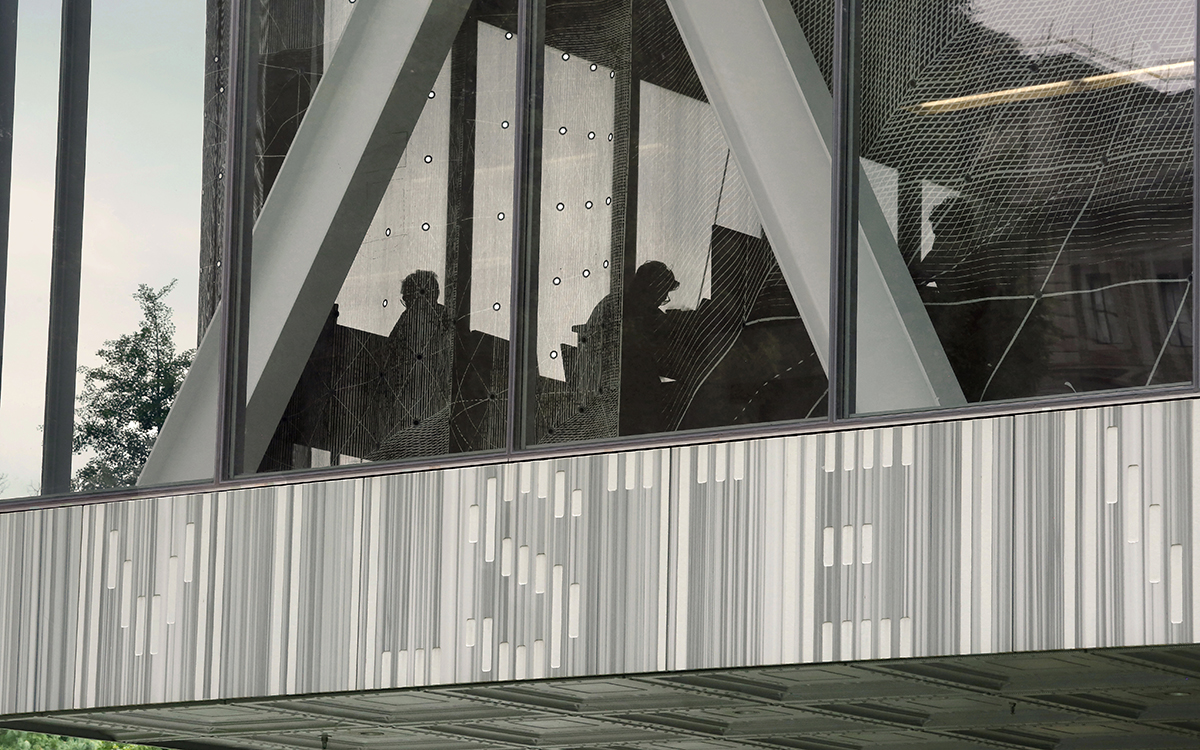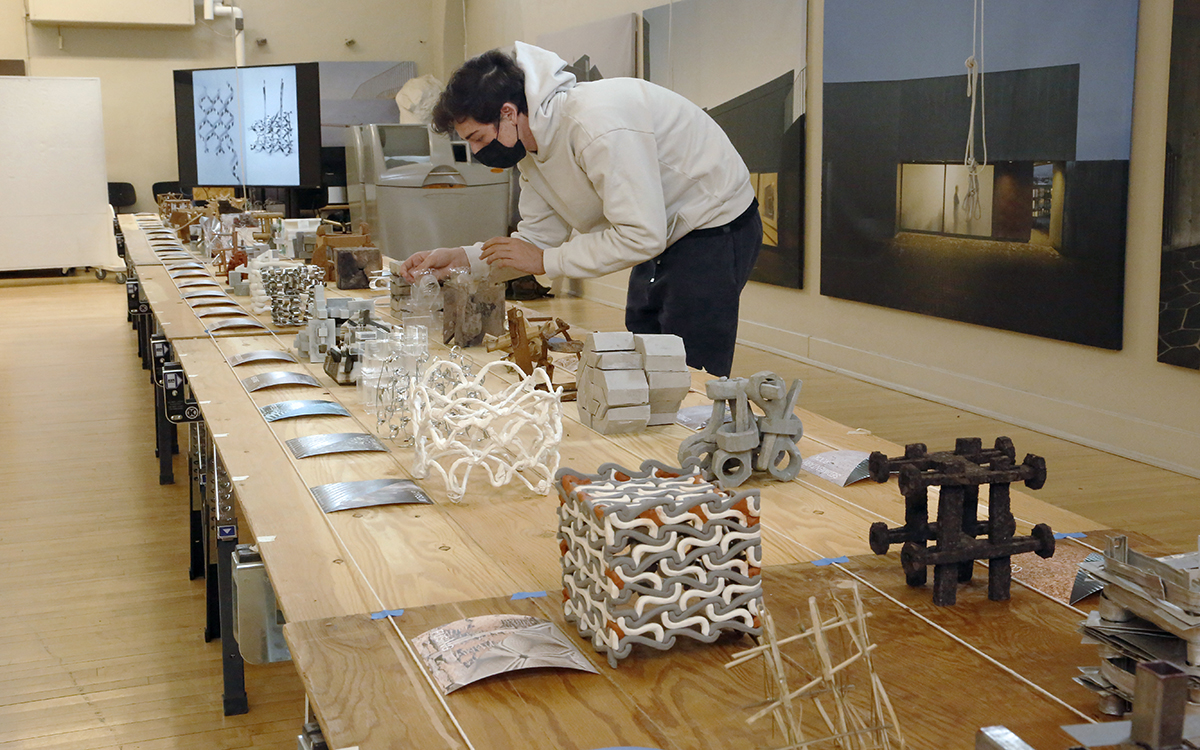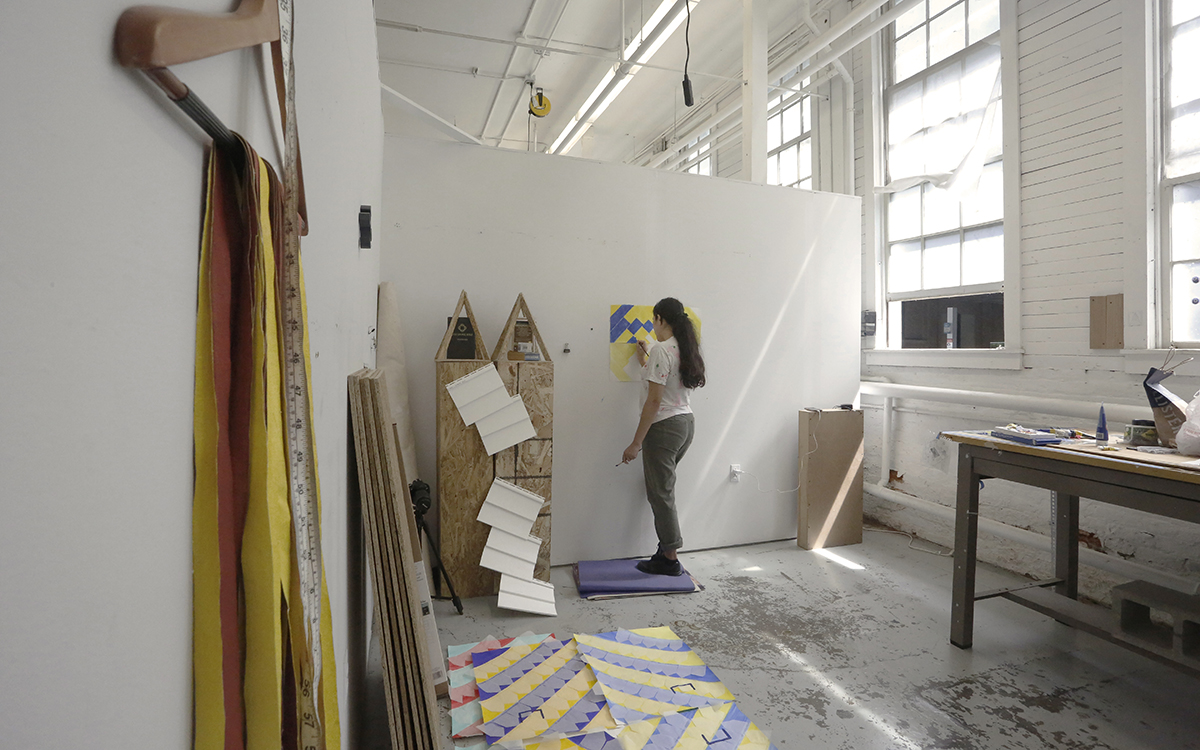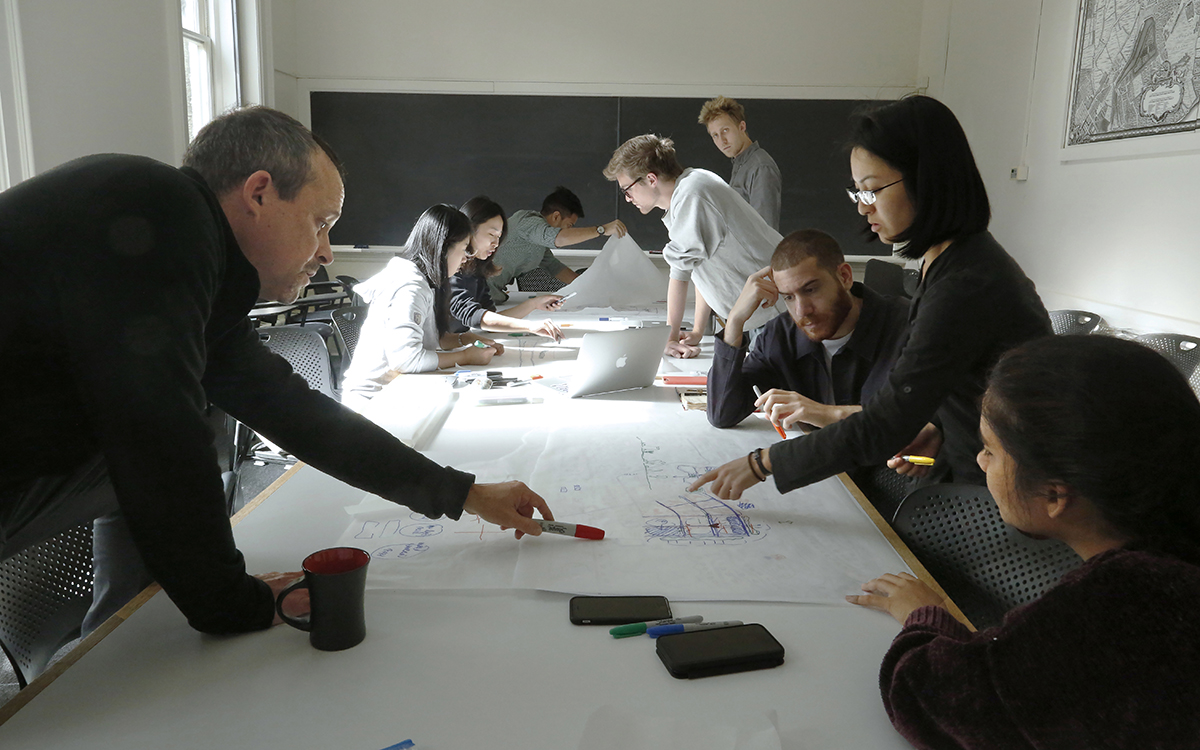New and Renewed: AAP's Fall 2021 Semester
The fall semester at AAP brings renewed energy with a host of new students, faculty, classes, and a welcome return of exhibitions, lectures, teaching, learning, and making at the Ithaca, New York City, and Rome campuses.

Students return to their desks in the L.P. Kwee Studios in Milstein Hall. photo / William Staffeld AAP
As Cornell thoughtfully emerges from the pandemic, classes and studio offerings at AAP will continue to provide expanded cross-disciplinary, collaborative spaces for investigation and work relevant to issues and challenges facing the world at all scales. This fall, AAP will welcome its largest-ever incoming class as enrollment is up 22%. The college will also see the most diverse class in the college's history with 36% underrepresented minority and 7% first-generation students.
A number of student diversity initiatives are underway this fall. The AAP Family Network is a pilot mentorship program that matches a group of students with an alumni "family." The program, cosponsored by Artist, Architects, and Planners of Color (AAPOC), aims to help demystify life after graduation, strengthen a sense of belonging for current students, and provide an opportunity for students and alumni to engage with the university community and beyond. Also meeting this fall, Queer Students of Cornell Architecture, Art, and Planning (QSAAP) is a dialogue group for incoming and current students, and alumni who self-identify as a member of the LGBTQ community.
Underpinning this work are returning faculty as well as new faculty in every discipline, new and returning staff; visiting speakers, critics, practitioners, and new leadership in all three departments, and associate dean positions created with the intent to continue to actualize AAP's living document and action plan that charts a course for "Building a Just and Equitable AAP."
As AAP responds to the demands of our time, the college also takes stock of the past. This year, the Department of Architecture celebrates 150 years since its founding in 1871, and the Department of Art marks 100 years from its formal recognition in 1921. Not long after, City and Regional Planning began its evolution in 1935.
Instruction at the Ithaca main campus, the Gensler Family AAP NYC Center, and the Cornell in Rome program will offer safe, high-level, and expanded environments for learning. Across departments and spaces, there will be increased opportunities for co-curricular programming that brings together architecture, art, and planning to examine, propose, and share creative responses to the many topics addressed by AAP's disciplines.
 First-year B.Arch. students display their models for the 2021 Edward Palmer York Memorial Prize competition and exhibition in the central second-floor work and critique space in Sibley Dome. photo / William Staffeld AAP
First-year B.Arch. students display their models for the 2021 Edward Palmer York Memorial Prize competition and exhibition in the central second-floor work and critique space in Sibley Dome. photo / William Staffeld AAP
Architecture Builds, Deconstructs, and Designs Through Collaboration, Making, and Critical Theory
Most students and faculty in the Department of Architecture will be in-person for classes and studios in Ithaca, New York City, and Rome this fall. On the Ithaca campus, the department plans to sponsor a variety of lectures, exhibitions, and events as architecture faculty member Edgar A. Tafel (Associate) Professor of Architecture Caroline O'Donnell steps into the department chair position.
Among many new faculty who joined the department this summer, Associate Professor and Director of the B.Arch. Program Sean Anderson (B.Arch./B.S. '96) will teach Unbuilding, a Special Topics in Theory: Architecture, Culture, and Society elective. Assistant Professor María González Pendás will lead Global Fascism in History and Architecture, an elective open to doctoral and graduate students as well as advanced undergraduates. Electives will also be taught by visiting critics, including Curt Gambetta (Fieldwork in Architecture), and Greg Keeffe (Remake Remodel: Adaptive Facades), among several others.
After a 17-month hiatus, AAP's Cornell in Rome program reopens this semester to host undergraduate art and architecture students for instruction in architecture design, history, and theory; visual arts; art history; and Italian language, history, and culture. Ithaca-based Assistant Professor Luben Dimcheff will lead the architecture design studio.
In New York City, offerings at The Gensler Family AAP NYC Center include several choices for option studios, special topics in architecture and visual representation, and cross-disciplinary offerings. The center anticipates the largest single-semester cohort in its 15-year history. Florian Idenburg begins a five-year appointment as the first New York City-based Professor of the Practice in Architecture, teaching an option studio and leading Ventures, a new lecture series. New Associate Professor in architecture Jesse LeCavalier and Visiting Critic Christopher Leong of Leong & Leong will also lead option studios, and Visiting Critic Peter Robinson (B.Arch. '98) returns for his third semester to lead a special hybrid option studio where planning and architecture students collaborate with local partners on critical urban issues in Brownsville; Brooklyn; and Jamaica, Queens.
Architecture students attending the AAP NYC Center may again study at Cornell Tech with Associate Professor and the Arthur L. and Isabel B. Wiesenberger Professor in Architecture Jenny Sabin. Sabin will teach an option studio for architecture students as well as Special Topics in Construction: Designing and Making Across Disciplines, a class for M.S. MDC (Matter Design Computation) and Cornell Tech graduate students. This fall, the transdisciplinary studio and seminar will also include participating Cornell faculty from Biomedical Engineering, Information Science, and Materials Science and Engineering. AAP NYC students are also eligible to enroll in the Product Studio, a pilot collaboration between AAP and Cornell Tech faculty in which student-led teams taught by Cornell Tech faculty and advised by Sabin work in partnership with various companies in advancing new technology solutions.
 Layla Zubi (M.F.A. '22) in her studio in The Foundry where graduate students in the fine arts work in their studio spaces.
Layla Zubi (M.F.A. '22) in her studio in The Foundry where graduate students in the fine arts work in their studio spaces. Art Offerings Expand From Music to Literature, Self to Culture, Ancient to Contemporary
The incoming B.F.A. class of 47 students is the largest in the Department of Art's history. Internationally recognized artist and educator Paul Ramírez Jonas joins the art faculty as chair and professor from Hunter College, and the department's series of fall artist talks promises to address a number of timely topics including indigeneity and the African diaspora.
New Mexico-based Native American multidisciplinary artist Cannupa Hanska Luger's talk on September 16 will be the first of many. Luger's multi-pronged projects and monumental installations incorporate ceramics, video, sound, fiber, steel, new media, technology, and repurposed materials to communicate stories about 21st-century Indigeneity. Working at the intersection of art, music, and literature, Keith and Mendi Obadike will give the Tenaglia Lecture on November 11 at the Johnson Museum of Art, cosponsored by the Johnson Museum's Rose Goldsen Archive Lecture.
Every semester, the Department of Art invites a new Teiger Mentor in the Arts, a practicing artist who makes ongoing visits to studio and seminar classes and conducts individual critiques with M.F.A. and B.F.A. students. The program aspires to give undergraduate and graduate students opportunities to make connections with and learn from a diverse range of leading professional artists. The Fall 2021 Teiger Mentor is Miatta Kawinzi, a Kenyan-Liberian-American multi-disciplinary artist, writer, and educator whose work explores hybridity within the African diaspora and the reimagining of the self, identity, and culture through abstraction and poetics. This fall, Kawinzi will meet with students on a weekly basis.
Also in art this fall, Assistant Professor Leeza Meksin, an interdisciplinary artist working in various mediums such as painting, installation, and textiles, begins teaching and advising at AAP. Philadelphia-based artist and arts organizer Kayla Romberger will teach printmaking, and Meksin will teach Introduction to Sculpture, introducing students to artistic practice in three dimensions, and First-Year Studio Research Workshop, which considers the social, cultural, economic, political, and art historical influences that define and redefine 21st-century contemporary art and artists.
B.F.A. students attending Cornell in Rome this fall will find de-densified classes and, if possible, they will be taught fully in person. In line with the welcome return of the Rome program, architectural and art history classes will take place on-site as they have been in the past and short field trips and site visits are currently on the itinerary. Rome-based art faculty Luca Padroni and Liana Miuccio will again teach introductory drawing and photography. Marco Palmieri leads the Contemporary Rome seminar, which looks at the contemporary art scene of Rome with studio visits and guest speakers. The strong component of on-site teaching encourages students to draw from their experience in the city, as well as from visits to museums and exhibitions.
 Planning students and faculty at work in West Sibley Hall, home to the Department of City and Regional Planning.
Planning students and faculty at work in West Sibley Hall, home to the Department of City and Regional Planning. City and Regional Planning Examines Policy, Place, Preservation, and Sustainable Practice
Fall classes, colloquia, and workshops in the Department of City and Regional Planning will cover a breadth of topics from policymaking to preservation law with a focus on equity and justice, the built environment, economic development, and climate change. The planning department will also host alumni and other guests for lectures and events, field trips that were postponed by the pandemic are back on the itinerary.
Special topics and seminars bring focus to planning's historical domains across scales and weave in contemporary complexities as seen by some of today's practitioners. Creating the Built Environment examines the underlying principles and organizing strategies for residential, retail, hotel, and mixed-use forms, issues critically important to meaningfully engage in the practice of real estate development. The fall class will be taught by Thomas Vecchione, a Baker Program in Real Estate Advisory Board member and principal at Vocon in Manhattan. Alumna Lynn Ross (M.R.P. '01) will teach Planning and Policymaking for Equity and Justice. Ross is the founder of Florida-based Spirit for Change Consulting, LLC, which works nationally and across sectors to create and sustain equitable policies, practices, and places. Also looking at equity and sustainable practices is Thomas Knipe (M.R.P. '11), deputy director for economic development in the City of Ithaca who brings expertise in local economic development, community-based tourism, and non-motorized transportation to his class Economic Development: Goals, Strategies, and Tools.
Taught by Assistant Professor Linda Shi, the class City and Regional Futures: Planning Practice, Policy, and Design brings domestic and international experts to Cornell to talk about research and practice aimed at shaping the future of communities and regions. The colloquium lecture series for the class kicks off with placemaker, author, and visiting faculty member at the University of Toronto Jay Pitter. Pitter will also give a workshop for faculty on the impact of urban policy and a Black sense of place.
Placemaking also extends to historic preservation and its influence on the future of communities. Professor Sara Bronin, newly hired in CRP, teaches Historic Preservation Law, an overview of the American legal system and the sources of law used to protect historic resources. Bronin was recently nominated by President Biden to chair the U.S. Advisory Council on Historic Preservation.
Guest speakers and field trips are fundamental to a deep investigation of the urban environment. Suspended in 2020 due to the pandemic, the annual CRP fall field trip is scheduled to take place in New York City in October, co-led by Professor Thomas Campanella and Bob Balder, the Gensler Sesquicentennial Executive Director of AAP NYC. To accommodate students unable to participate in 2020, a second trip will take place in spring 2022. Campanella will also lead the annual URS field trip with OURS. Expanding the focus on urban design, social mobilization in the context of climate change, and public health, fall lecture series speakers include Kian Goh, Assistant Professor of Urban Planning at UCLA, and Manal Aboelata, the Deputy Executive Director of Prevention Institute.
Planned exhibitions in the West Sibley Hallway include the 2020 and 2021 poster competition winners, the Urban Land Institute ULI Hines Student Competition entries, and an exhibition to coincide with a special event honoring the life of Professor Emeritus John Reps. An expert on planning history and the wide range of urban planning representations that drive both planning research and the methodologies of practice, Reps's commitment to the department spanned more than 70 years. Christopher Silver of the University of Florida Department of Urban and Regional Planning will give a talk followed by a faculty and alumni panel discussion and reception.
Looking ahead, CRP furthers its commitment to social equity, community, and sustainable social policy in welcoming Professor Sophie Oldfield as the new department chair, effective January 1, 2022. Oldfield comes to Cornell from the University of Cape Town and the University of Basel Professorship in urban studies and brings a track record of excellence in pedagogy and collaborative research practice.
Stay connected! Follow @cornellaap on instagram, facebook, twitter and linkedIn, and subscribe to our AAP bi-weekly newsletter.






